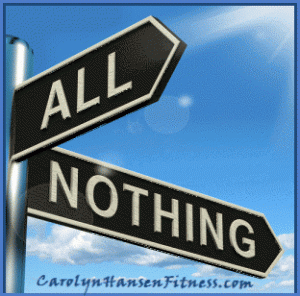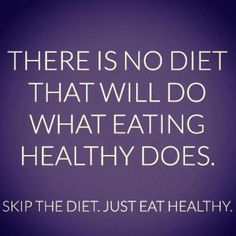 Does your fitness or exercise plan have two speeds, turbo and idle? If so, you might be stuck in an “all or nothing” style of thinking. This way of thinking means you have to go “all in” if you want to achieve great results.
Does your fitness or exercise plan have two speeds, turbo and idle? If so, you might be stuck in an “all or nothing” style of thinking. This way of thinking means you have to go “all in” if you want to achieve great results.
You have to do everything correctly, or you might as well not even try. You either strictly stick to that eating plan and make sure every meal is perfect, or you screwed up because you ate that damn cupcake and go back to previous habits. All, or nothing.
Maybe you can attest to the failure of the “all or nothing” approach from past experience.
While it is great to be capable of pouring yourself into change, extreme change can undermine the potential for long-term success.
Your Exercise and Eating Plan
When was the last time you tried a new exercise or eating plan?
Did you start them thinking, “I’m going to succeed this time and follow this thing perfectly”? And…for a few days, or maybe even a week, you followed the rules without deviation.
But then, a special occasion came up or it was someone’s birthday, or a holiday, or there was a “shout” at your work. And you ate or drank something you “weren’t supposed to” because it was off-limits from your eating plan.
“I screwed up,” was likely the thought you had because you broke the rules and this one slip up then turned into an entire day of “bad eating” because you rationalised that you already screwed up and ruined the day, so what the heck? You’ll start over again tomorrow!
And the vicious cycle continues. You start back with determination but, inevitably, something again will derail your efforts.
All or Nothing At All
It’s either all, or nothing. Follow the “rules” perfectly, or abandon the idea.
The all or nothing approach with nutrition or exercise causes people to fail way too often, or rather: the all or nothing approach fails them.
You only have to look to the New Year’s resolution crowd to discover the truth of the failure from an all or nothing mind-set. January 1st is the date most people radically change their eating and workout habits. They say they are going to workout 6 days a week and completely change how they eat.
From out of shape couch potato to “I’m going to look like her!” (or him) in the shortest time possible is the goal, and the all or nothing approach is the golden ticket.
We all know what happens: Toward the end of January and into February, the “all or nothing” crowd has progressively decreased. Sure they were 100 percent “all in” at the beginning but because they likely “screwed up” a few times, they were back to nothing.
It was too hard, too difficult. It was unrealistic and impossible to maintain. They gave up … AGAIN. Apparently they could not go “all in.”
For most people the all or nothing approach doesn’t work. If you are reading this and are nodding in agreement because that reality is all too familiar, then AVOID the “all or nothing” mentality and adopt an approach that, instead will actually work so you can achieve and maintain, great results.
You must have flexibility with your health and fitness regimen so when those events happen you can adapt and that is something the all or nothing approach doesn’t allow. If you want to achieve and maintain results you must be able to adapt to the situation or new circumstances.
Health and Fitness is a Lifelong Journey
Health and fitness, after all, needs to be a lifelong journey, not a quick-fix solution and for that to happen what you do must fit  into your life and not demand you revolve your life around it.
into your life and not demand you revolve your life around it.
Sure, it’s challenging to stick with a regular exercise program or a healthy eating plan even WITHOUT the responsibilities of everyday life – kids, spouse, home, job and so on. Having to work late one day can mean you miss a workout. The thing is, missing a workout does not mean you have blown your whole regimen. Being affected by life’s little bumps does not mean you are weak. It means you are simply human.
But if you have been pressuring yourself to be perfect, it won’t be long till you decide you are weak or that your job/family/life/whatever is conspiring to keep you out of shape. And then, you give up.
It isn’t your life that’s doing the conspiring – it’s you and your thoughts.
Getting to the gym once or twice a week or sticking to a healthy eating plan 50 percent of the time is not failure.
You need to be flexible, especially at the beginning of a lifestyle change. Yes, it’s important to make a plan and do your best to stick with it. But if (when?) you falter, let your missteps help you create an even better plan that suits your real life, not the imaginary obstacle-free life when you first embarked on your plan.
Its easy to forget lifestyle changes are not a single quick fix process. It is not a happening or an event. It is the result of 100’s of tiny steps day after day, workout after workout and healthy meal after healthy meal.
It is a systematic process, one that doesn’t produce huge changes overnight and is not a quick sprint.The problem with all-or-nothing thinking is that it does not take this into consideration.
When it comes to health and fitness, “something” trumps nothing, every single time
For a simple effective fitness plan that includes an exercise program and eating plan go here:
If you need help from not one but TWO gym owners who are willing to share their expertise with you, go here for an online coach:








